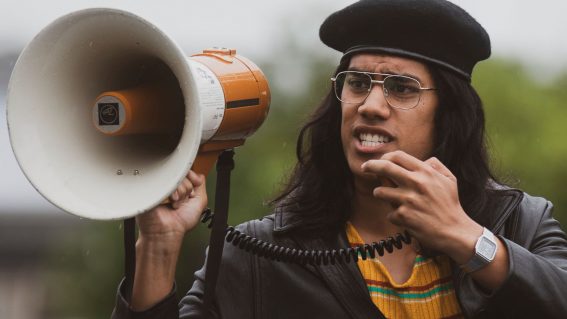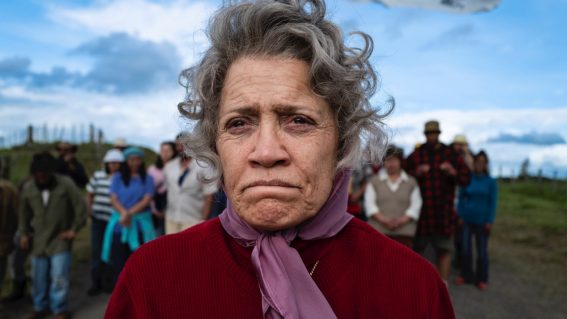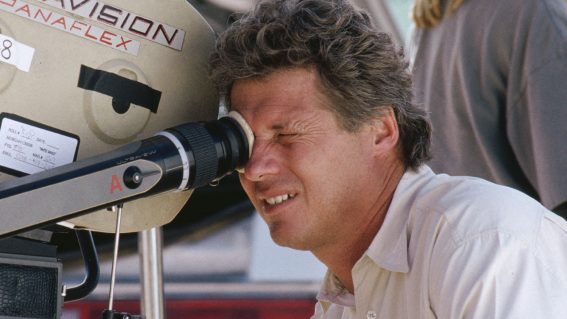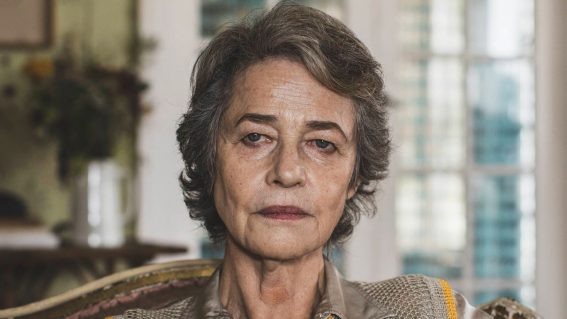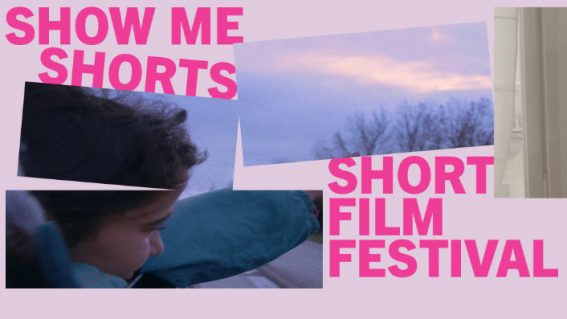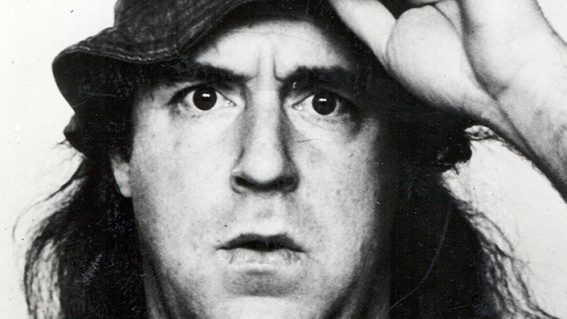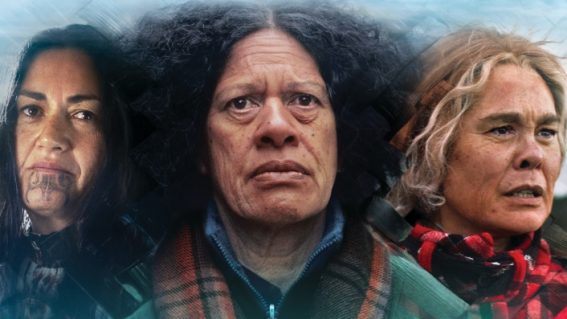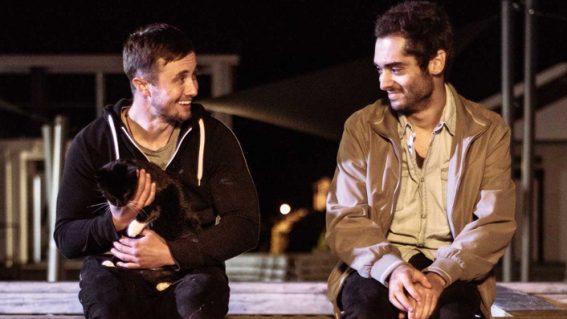Gaylene Preston – making Mr Wrong
We set up a production office in a rundown warehouse in Oak Park Lane and started contracting crew. Robin then had to handle the fact that the guys, though they were perfectly happy to work alongside me when I was art-directing, weren’t feeling so confident about me directing them. Although in my head I […]
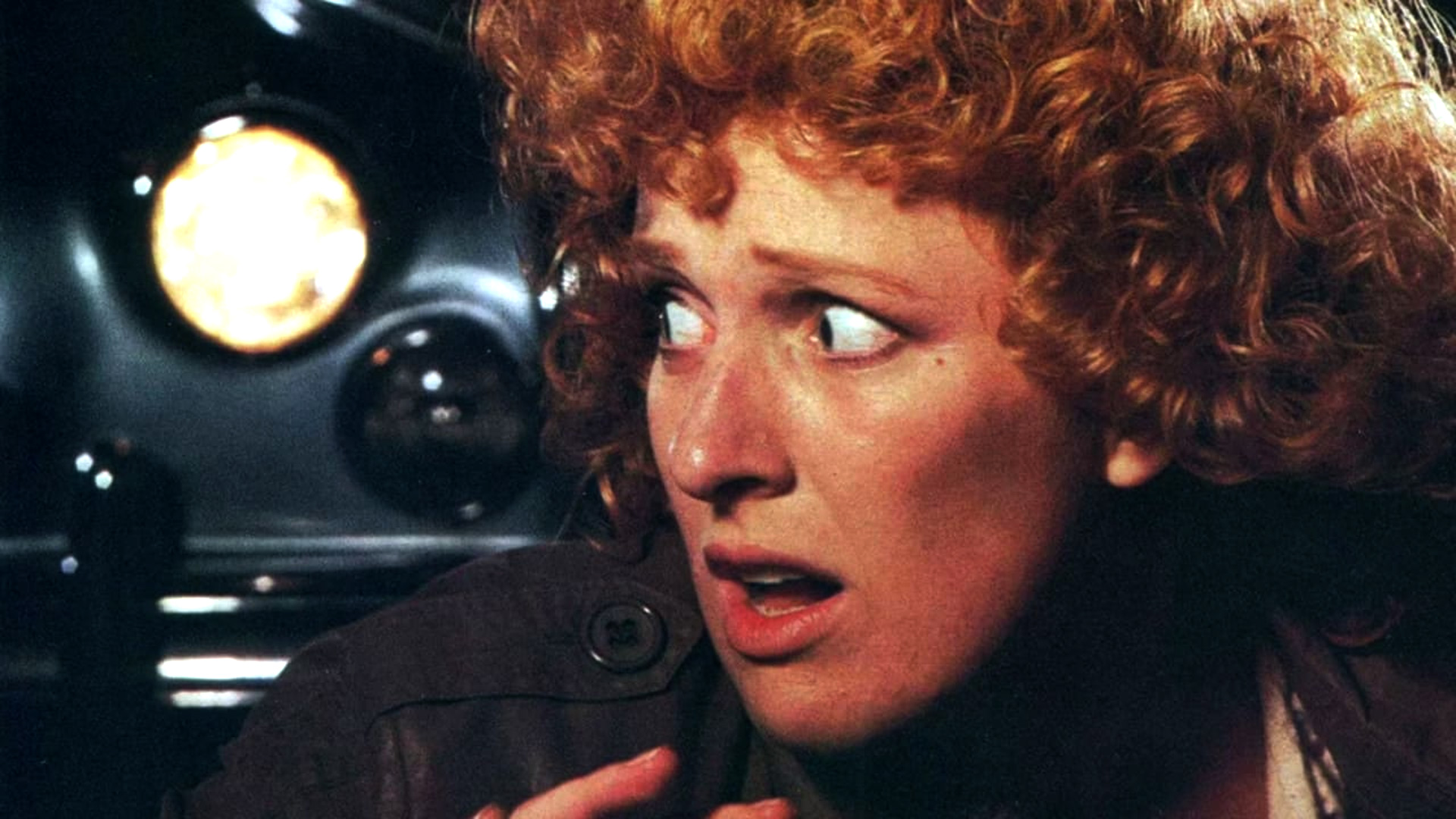
We set up a production office in a rundown warehouse in Oak Park Lane and started contracting crew. Robin then had to handle the fact that the guys, though they were perfectly happy to work alongside me when I was art-directing, weren’t feeling so confident about me directing them. Although in my head I was the most brilliant filmmaker since Robert Altman, and at the time one of the most experienced filmmakers ever to make a first feature in the country, they didn’t feel comfortable.
I’d produced and directed five documentaries by now: All the Way Up There, Learning Fast, Making Utu, Hold Up (which included drama), and I’d helped with Patu!. Plus, All the Way Up There and Hold Up had won international awards. And I had production-designed a feature (Middle Age Spread) and heaps of commercials. But this was not worth a hill of beans in this tiny town. Many people I really admired turned me down – they read the script and in various kind ways told me they thought it was ‘a bit silly’. To be fair, we were working in the middle of a closing-down sale. Anyone who could stand behind a camera in any capacity had a job. That clock kept ticking.
It was actors who kept me going. They liked the script. A moment’s grateful silence for actors. They are the bravest people I know. You can ask them to do something that you would never ask any other living soul to do, and they give it a go. (They may complain about it afterwards, but that’s another story.) The actors came to my auditions and made that worrisome script glow. They leapt about the place, forgot their words with nerves, cried, and did all those terrific things we love them for. When I found Heather Bolton to play Meg, the script leapt into focus. It was going to be funny – and if I came at it on the right trajectory, I could scare the pants off the punters while they were still laughing.
Hindsight is a great thing. I’m sounding far more certain here than I was. But Robin kept doggedly making the calls and signing up crew. I had met Canadian cinematographer Thom Burstyn at Cannes when he was supporting the promotion of The Lost Tribe. It had a moody look that could fit. Undeniably a terrific cinematographer, he even agreed to our pathetic fee. So did Alun Bollinger, a long-time collaborator. Albol is one of the greats of New Zealand cinema and a good mate. I asked him what he wanted to do, light or operate – he said he didn’t mind, so I got him behind the camera. His intuitive eye and our close history give Mr Wrong an immediacy that enhances the suspense. A suitable key location was found just down the road from where I lived in Roxburgh Street. We bought a Mk II Jag and, with a first assistant director who never understood what the hell I was doing, and a crew of Bindy Crayford (the first female gaffer in New Zealand), Matt Murphy and Jonathan Crayford doing special effects, Robin Murphy in the art department and her mother, Pat, production-managing, we lurched into it.
Every now and then, the money was late – but generally it arrived. I knew the cashflow was dodgy. This way of financing was about to become illegal any moment anyway. But there was too much smiling and covering of mouths coming down from the folk up north to feel entirely confident. We decided to just keep going until someone told us to stop. No one did, but it got to the point where I would just get up every morning expecting the whole thing to grind to a halt. I’d concentrate on shooting the schedule every day and live to face tomorrow. I still don’t know exactly how Robin managed to keep the show on the road as long as she did – you’d have to ask her. She may not tell you.
One day it was in the news.
Mr Wrong, ‘a Wellington film currently shooting on Mount Victoria’, was being halted by a financier neither of us had ever heard of, Toa Woodbine Pōmare. We got Jim on the phone. Our heads of agreement document had apparently been sold by the Te Kūiti millionaire who’d owned it. He had fallen out with the Queen Street crowd and presumably didn’t need the licence to print money anymore. He’d flicked it to another financier who did. And that financier was busy injuncting the film in the High Court. Spookily reminiscent of what had happened with Windy Autoport.
The Film Commission – you will remember they’d said a definite ‘no’ – had, when the money slowed from a drip to nothing, forwarded us a kind of short-term commercial loan that they offered overseas productions to fill gaps in cashflow. It was called a star loan. We had one. Now the new proud owner of our film wanted some of that ol’ star loan too. We advised against it, and Jim agreed. We never met Toa Woodbine, but by this time we were suspicious of guys who wanted to help, and after he had taken his slice off the top, how much of it would trickle down to the screen was not disclosed. Ages before the one per cent arrived on this planet, I had never been a fan of the trickle-down theory. If it was an actual thing, it wouldn’t be called a theory, would it. It would be called a factor. Even by 1984, I’d only ever seen money trickle up.
By some weird stroke of God’s pencil, Toa Woodbine and his partners decided to sue the Film Commission as well as Robin and me. We learnt this, along with everyone else, from the six o’clock news on National Radio on a Tuesday. We decided to call a crew meeting, and tried to explain. Their eyes glazed over after a while, then some bright spark said, ‘Does it affect the next shot?’
‘Hmmm. Well, no.’
And they all stood up and someone got the clapperboard out.
Every morning tea, lunch and afternoon tea time was spent on the phone conversing with our ‘stakeholders’. The Film Commission didn’t like being sued. Particularly over a film they had turned down flat. The commissioners weren’t filmmakers; they were lawyers. And now, they were mad. They went to war with great gusto on our behalf. They rode up on their chargers and rescued us . . . from ourselves. You will recall that they were generally put there by government officials to teach the filmmakers about real business, so a case in the High Court was something they could certainly take on – with alacrity. This meant Jim Booth had full permission to get the filmmakers in question deeply into debt very quickly. Before every pay day, he sent over the ten-page star loan legal document that proved Robin Margot Laing and Gaylene Mary Preston owed a growing sum of money back to the Film Commission, due date in August 1985. They were bailing us out, but I had become a born-again contract reader and every clause said, ‘You must pay this back by the due date or crippling interest will be charged.’ I kept refusing to sign, then after long phone calls I would fold.
Never a borrower nor a lender be. That was my upbringing. I drove Robin and Jim crazy as our debt quickly grew past $100,000 and kept going. To give you the context, our location house was valued at $27,000.
Every payday now, our crew were worrying. They would sidle up in ones and twos waving their weekly cheque and ask in a conspiratorial fashion, ‘Am I supposed to bank this?’ That’s the Mr Wrong crew for you. Once they’d committed, they were in for the long haul.
When we had nearly completed the shoot, we received a different legal document. Our godfather in the north was urging us to sign over the rights of Mr Wrong to his production company to protect us. Who from, it wasn’t entirely clear. There was a ‘Don’t worry your pretty little heads about it’ vibe that had worked for me once, but now just didn’t cut the mustard. You do learn; it’s crisis development.
So here was another document I wouldn’t sign. And not because we couldn’t afford a lawyer. As it says in a Hitchcock film, ‘If it don’t gel, it ain’t aspic.’ My intuition was kicking in and I was learning to listen to it. Normally, the rights would have correctly been handed over to the financiers before a single frame was shot, but because of the headlong runaway train the film had been, none of this had occurred. This meant that I still held the rights – and now, considering that we were up to our elbows if not our necks, I wanted things to stay that way. My sunny lunch with Elizabeth Jane Howard under her quince tree in Hampstead felt like years ago.
I had a funny feeling that once I signed them over, we, the producers, would lose any vestige of control in the situation that we thought we had. But these rights evidently needed to be ‘protected’, i.e. separated from the company that was making the film. Apparently. I didn’t quite understand how that would work, but legal advice had been ‘strongly given’ . . . up north. Quite a bind. What to do? And my head wasn’t entirely clear to think about it, because we were still shooting and my commitment to the actual ending of the story was looming. By the time I had watched rushes, I was working six fourteen-hour days a week. I was with Ringo when he said he’d had a hard day’s night. I hadn’t had a day off for weeks. Praise the goddess I’m a good sleeper. Make your films when you are young. Or fight for better working conditions.
When I was living in London, we got worried that the gas man might spot our marijuana growing in the atrium, so we moved the crop, but not to our own backyard. We grew it in the garden of a very good friend of ours. We knew it was safe from marauders over there at her place in Clapham, because she hated the stuff. So my lifetime rule of thumb is: don’t give anyone anything to look after if they might like it for themselves. Applies to lettuces, tomatoes and also film rights.
I racked my brains to think of someone I knew who already had a company not associated with Mr Wrong. Someone who knew the film trade, who wouldn’t want the rights, who wasn’t a lawyer who could get struck off, but someone who would never hand them over to any legal beagle no matter how many court cases they might be threatened with. Someone who might even enjoy the fray, should it eventuate. I woke up one morning with the solution. My mechanic, Andy Grant of Mickey Mouse Motors, hated the establishment. He could keep an angry letter exchange – with, say, the Wellington City Council on some tiddly planning issue – going for years. He was as staunch as you could get and pretty cluey in the ways of certain producers, being a partner in the Acme Sausage Company. It was he who kept the yellow Mini going as they shot on the back roads all over New Zealand for that other hit movie you will know. During morning tea time, in our usual preferred private conversation spot – the upstairs loo – I ran the plan past Robin.
My solution to our current dilemma was to sign over to Mickey Mouse Motors the whole rights document. All twenty-seven clauses of it. Worth a try, she agreed. I whistled up the road at lunchtime to call him.
‘I don’t want the rights to your poxy movie, Gaylene,’ was his first reaction.
‘I know. That’s why I want you to have them.’
A slight pause.
‘Well, how much are they?’
‘One dollar?’
‘Far too fuckin’ much.’
He agreed after I promised to bring him fish ’n’ chips next time I saw him.
Back down the road to shoot the last shots of the day. There is a real advantage to having your key location close to home.
We prepared the documents immediately. Andy Grant insisted that we filled in his ‘occupation’ as ‘alchemist’. He signed; I didn’t. Into the middle drawer it went, ready to produce in a twinkling should it ever be needed. It never happened of course. After we finished shooting, a guy arrived at the production office to serve a writ. I wouldn’t accept that either. Ever since Windy Autoport had stolen my car, I was as brave as tigers.
After a court case to allow us to continue filming, and another to allow post-production, it all ended up in the High Court, with Hugh Rennie defending us. He was the only man in New Zealand who everyone agreed knew the foggiest thing about copyright law. This was by now February 1985, and we couldn’t take the completed film out of the country without being slapped with an injunction. By this time, those financiers had moved on to other things, like hurricane housing in the Pacific. That was the big money-spinner now, evidently. No lawyer representing them arrived to present their case, paradoxically making it harder for Hugh to get the injunction lifted. The judge looked perplexed. With that secret forelock-tugging code that lawyers do in court, Hugh suggested he speak to the judge in chambers.
After a five-minute adjournment they returned all smiles. Mr Wrong could be designated officially as perishable goods, and we were herewith ordered by the High Court of New Zealand to get it to the market immediately. That, we were only too happy to do.
When it hit the Cannes Market that year, New Zealand Film Sales signed deals for sixty-seven territories, including the United States. Mr Wrong remains the only film in the world, that I know of, officially registered as perishable goods. Thirty years later, I ran into Hugh at an airport. He commented that Mr Wrong was the longest-lasting piece of fresh goods to leave the country.
I have often pondered on what the outcome would have been had the original case left the Film Commission out and been a claim against the producers only. God is indeed a woman.
During that court case, Robin and I were invited to the meetings held at Hugh’s offices, around the very long, very shiny table. At the first one, he went around the room pointing. ‘I will represent you, you, not you, not you, you,’ and so on. The ‘not you’s were the fairy godfather and his lawyer from Hamilton. If I hadn’t hung onto the rights, I have a funny feeling that those long shiny table meetings between the Film Commission and Hugh Rennie may have proceeded without the producers in the room, who everyone agreed to a man were innocent.
‘You girls haven’t broken the law,’ we were assured, and Robin and I – in between feeling very grateful to every single one of them, including our friend in the north – congratulated each other on having maintained girlhood status at the grand old age of thirty-seven. Was the warm wind about to blow through our hair?





